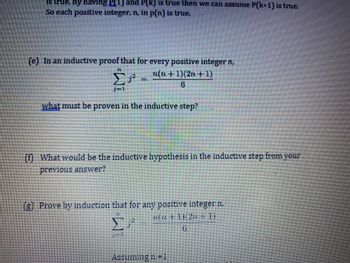
Advanced Engineering Mathematics
10th Edition
ISBN: 9780470458365
Author: Erwin Kreyszig
Publisher: Wiley, John & Sons, Incorporated
expand_more
expand_more
format_list_bulleted
Question
(e) In an inductive proof that for every positive integer n,
What must be proven in the inductive step?
(f) What would be the inductive hypothesis in the inductive step from your previous answer?

Transcribed Image Text:is true. By having P(1) and P(k) is true then we can assume P(k+1) is true.
So each positive integer, n, in p(n) is true.
(e) In an inductive proof that for every positive integer n,
JE
n(n+1)(2n+1)
P
what must be proven in the inductive step?
What would be the inductive hypothesis in the inductive step from your
previous answer?
(g) Prove by induction that for any positive integer n.
H
n(n+1)(2n-1)
Σ
6
Assuming n=1
Wi
Expert Solution
This question has been solved!
Explore an expertly crafted, step-by-step solution for a thorough understanding of key concepts.
Step by stepSolved in 2 steps with 1 images

Knowledge Booster
Similar questions
- Use the definitions of even, odd, prime, and compositive numbers to justify your answers for (a)-(c). Assume that r and s are particular integers. (a) Is Srs even? O Yes, because 8rs = 2(4rs) + 1 and 4rs is an integer. O Yes, because 8rs = 2(4rs) and 4rs is an integer. O No, because 8rs = 2(4rs) and 4rs is an integer. O No, because 8rs = 2(4rs) + 1 and 4rs is an integer. (b) Is 2r + 4s² + 9 odd? O Yes, because 2r + 4s² + 9 = 2(r + 2s² + 4) + 1 and r + 2s² + 4 is an integer. O Yes, because 2r + 4s² + 9 = 2(r + 2s² + 4) and r + 2s² + 4 is an integer. O No, because 2r + 4s² + 9 = 2(r + 2s² + 4) + 1 and r + 2s² + 4 is an integer. O No, because 2r + 4s² + 9 = 2(r + 2s² + 4) and r + 2s² + 4 is an integer. (c) If rand s are both positive, is r² + 2rs + s² composite? O Yes, because 2² + 2rs + s² = (r + s)² and r + s is an integer. O Yes, because r² + 2rs + s² = (r + s)2 and r + s is not an integer. O No, because 2² + 2rs + s² = (r + s)² and r + s is not an integer. O No, because 2 + 2rs + s² =…arrow_forward1. Induction and prime factorisation of natural numbers: Let n E N be a natural number. A prime factorisation of n is an equation n = prime number and d; e {0}UN. Using Mathematical Induction, prove that every natural number has a prime factorisation. di d2 P1 P2 de ..Pk where for i = 1, . . . , k, The following statements inay be useful in your proof: (Q1) Vm, n E N (m 2) →arrow_forwardDiscrete Mathematicsarrow_forward
arrow_back_ios
arrow_forward_ios
Recommended textbooks for you
 Advanced Engineering MathematicsAdvanced MathISBN:9780470458365Author:Erwin KreyszigPublisher:Wiley, John & Sons, Incorporated
Advanced Engineering MathematicsAdvanced MathISBN:9780470458365Author:Erwin KreyszigPublisher:Wiley, John & Sons, Incorporated Numerical Methods for EngineersAdvanced MathISBN:9780073397924Author:Steven C. Chapra Dr., Raymond P. CanalePublisher:McGraw-Hill Education
Numerical Methods for EngineersAdvanced MathISBN:9780073397924Author:Steven C. Chapra Dr., Raymond P. CanalePublisher:McGraw-Hill Education Introductory Mathematics for Engineering Applicat...Advanced MathISBN:9781118141809Author:Nathan KlingbeilPublisher:WILEY
Introductory Mathematics for Engineering Applicat...Advanced MathISBN:9781118141809Author:Nathan KlingbeilPublisher:WILEY Mathematics For Machine TechnologyAdvanced MathISBN:9781337798310Author:Peterson, John.Publisher:Cengage Learning,
Mathematics For Machine TechnologyAdvanced MathISBN:9781337798310Author:Peterson, John.Publisher:Cengage Learning,


Advanced Engineering Mathematics
Advanced Math
ISBN:9780470458365
Author:Erwin Kreyszig
Publisher:Wiley, John & Sons, Incorporated

Numerical Methods for Engineers
Advanced Math
ISBN:9780073397924
Author:Steven C. Chapra Dr., Raymond P. Canale
Publisher:McGraw-Hill Education

Introductory Mathematics for Engineering Applicat...
Advanced Math
ISBN:9781118141809
Author:Nathan Klingbeil
Publisher:WILEY

Mathematics For Machine Technology
Advanced Math
ISBN:9781337798310
Author:Peterson, John.
Publisher:Cengage Learning,

